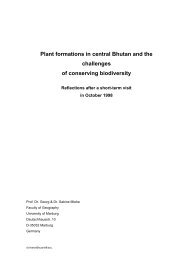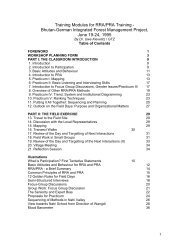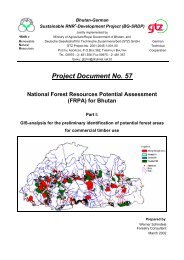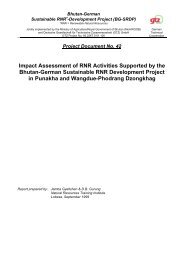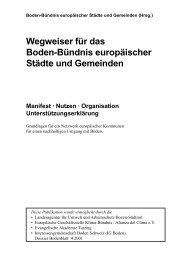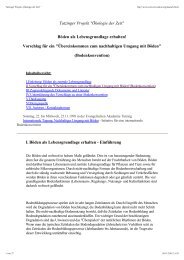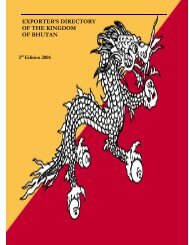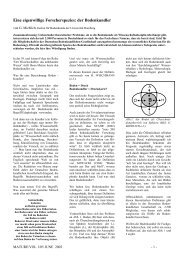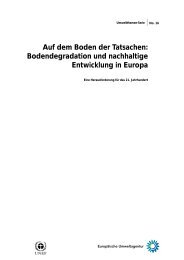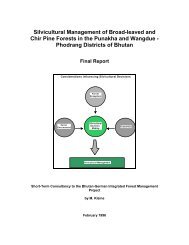GTZ Project Document No. 51 Report on Nahi Baseline Survey
GTZ Project Document No. 51 Report on Nahi Baseline Survey
GTZ Project Document No. 51 Report on Nahi Baseline Survey
You also want an ePaper? Increase the reach of your titles
YUMPU automatically turns print PDFs into web optimized ePapers that Google loves.
<strong>Nahi</strong> Approach Road of Hope RRA <strong>Survey</strong> May 2001At least eleven issues face practiti<strong>on</strong>ers of Rapid Rural Appraisal. Resoluti<strong>on</strong>s of these issuesdetermine what will be discovered and how results will be used. These issues are:Definiti<strong>on</strong> of the c<strong>on</strong>cept; 2) Durati<strong>on</strong> of the Study; 3) Participati<strong>on</strong> <strong>on</strong> the Rapid Appraisal Team; 4)Research Orientati<strong>on</strong>s; 5) Structuring the research time; 6) Informati<strong>on</strong> to be collected in advance; 7)Use of Interviews; 8) Use of direct observati<strong>on</strong>; 9) Preparati<strong>on</strong> of the <str<strong>on</strong>g>Report</str<strong>on</strong>g>; 10) Getting resultsfactored into decisi<strong>on</strong>s and 11) Potential Problems1. DEFINNING THE CONCEPTRapid Appraisal is a way of organising people and time for collecting and analysing informati<strong>on</strong> wheretime c<strong>on</strong>straints demand decisi<strong>on</strong>s before local situati<strong>on</strong> can be fully understood. Sometimes thesedecisi<strong>on</strong>s c<strong>on</strong>cern additi<strong>on</strong>al research such as the c<strong>on</strong>tent of a formal survey or the focus of l<strong>on</strong>g-termethnographic research.One of the strength of Rapid Appraisal is the flexibility to adjust it to specific objectives. While muchgreater rigour in the use of the standard social science methodologies is needed, rapid Appraisal cannotand should not have a single standardized methodology. Local c<strong>on</strong>diti<strong>on</strong>s, available resources andspecific research objectives should always determine how Rapid Appraisal is implemented. Some ofthe definiti<strong>on</strong>s are;Any systematic activity designed to draw inferences, c<strong>on</strong>clusi<strong>on</strong>s, hypotheses, or “assessment”, whichincludes the acquisiti<strong>on</strong> of new informati<strong>on</strong>, in a limited period of time.A study used as the starting point for understanding a local situati<strong>on</strong>; carried out by a multi-disciplinaryteam; lasting at least four days but not more than three weeks; and based <strong>on</strong> informati<strong>on</strong> collected inadvance, direct observati<strong>on</strong> and interviews where it is assumed that all relevant questi<strong>on</strong>s can not beidentified.Rapid Appraisal has been described as:“Modified survey” (Hildebrand 1982)“<strong>Survey</strong> undertaken without questi<strong>on</strong>naires” (Haner et al. 1982)“Informal,” “exploratory,” “ largely unstructured interviews combined with observati<strong>on</strong>” (H<strong>on</strong>adle1979)“Organised comm<strong>on</strong> sense, freed from the chains of inappropriate professi<strong>on</strong>alism” (Chambers 1980)“ A form of appropriate technology: cheap, practical and fast” (Bradfield 1981).2. DURATION OF THE RAPID APPRAISALThe most comm<strong>on</strong> problem is too much rushing and haste. The key to good rapid appraisal is allowingenough time to be observant, sensitive and eclectic and to follow up <strong>on</strong> leads (Carruhters and Chambers1981). Anything less than four days is inadequate for carrying out discussi<strong>on</strong>s, and for identifying,discussing and rejecting ideas that emerge from these discussi<strong>on</strong>s, and for putting these ideas togetherin a usable form (Chambers 1983). An appraisal that is too l<strong>on</strong>g may waste project time and causeparticipants to view the Rapid Appraisal as an end itself instead of as a new development tool.Anything less than four days is probably “Development Tourism,” and anything more than three weeksprobably puts too much emphasis <strong>on</strong> Rapid Appraisal. The flexibility inherent in Rapid Appraisal mustextend to the definiti<strong>on</strong> of the term “rapid” even if a minimum and maximum time is stated. Likewisedefining a minimum and maximum time does not prelude a series of rapid appraisal. Field experienceunder different c<strong>on</strong>diti<strong>on</strong>s should provide guidance <strong>on</strong> whether there is a need for an explicit minimumand maximum time.3. PARTICIPATION ON THE RAPID APPRAISAL TEAMTeam SizeSmaller team are preferred to larger teams. Members of large teams are more likely to talk to <strong>on</strong>eanother and less likely to listen and learn from others than members of small teams. (Rhoades 1982).Team Compositi<strong>on</strong>RRA is usually carried out by a Multidisciplinary team. Complex systems are more quickly understoodby a team c<strong>on</strong>sisting of several disciplines. Teams should be formed based <strong>on</strong> the type of study. Forexample Rapid Appraisal focusing <strong>on</strong> agriculture will often have a mix of biological and socialxx



